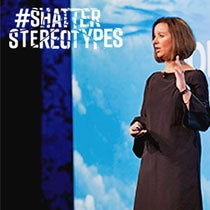Take a Risk: Donna Morris on Women in Business

Stereotypes are everywhere – you’ve probably heard people say “boys are rough,” “girls are delicate,” “men are aggressive,” or “women are caregivers.” What’s concerning is that people can let these perceptions become reality, defining who they are. Research suggests that girls as young as six years old believe a stereotype about women not being as smart as men. That kind of misperception can carry through a person’s life, and it can limit personal and professional potential.
In celebration of International Women’s Day and Women’s History Month throughout March, we’re featuring women who are shattering stereotypes in their personal and professional lives. From artists to engineers, women who have forged their own path inspire us and women everywhere to accomplish whatever they dream of being.
For our first story, we talked with Donna Morris, executive vice president of Customer & Employee Experience at Adobe. Coming from a human resources background, she has shattered stereotypes about the role HR can play in driving business transformation. She has also reinvented herself and her function as much larger than traditional HR, inspiring her team and industry peers in the process.
Donna, tell us a little about your career path.
I took my first part-time job when I was 13, working at a dry cleaner, and I continued to hold part-time jobs throughout high school and university. Those early jobs instilled a strong work ethic in me that I’ve carried throughout my career. After graduating from Carleton University in Canada, I accepted my first position in human resources. I loved it and made a goal to someday run a large human resources organization. I believe having a vision of your career path is important to anyone’s success – it certainly has helped me.
I spent my early career working in various HR positions across different industries and eventually met my goal of leading an HR function. I became vice president of HR at a company called Accelio, which was acquired by Adobe in 2002. Five years later, at Adobe, I was promoted to senior vice president. Over time, my responsibilities have expanded to include facilities and also our customer support organization. Now, my focus is on the success of Adobe employees and our customers. While I always envisioned leading an HR role, staying open to new ideas and taking risks has allowed me to steer my career in a way that I couldn’t have imagined at the start.
How do you feel you have shattered stereotypes in your role?
In my early career “growing up” in the HR profession, I wasn’t blind to the stereotype of an HR professional: people pleasers (usually women) who often were very kind and helpful, but not at the table when serious business decisions were made. I didn’t buy into that stereotype at all — it was too limiting and people are at the center of a business’ success, so HR should play a critical role in making business decisions. Throughout my career, I’ve focused on how we — in HR — can collectively move the needle and have a bottom-line impact on the business. I have made some big moves that have really disrupted how work is traditionally done — like eliminating annual performance reviews and dramatically expanding family leave — and those initiatives have had a positive effect on people, and our business.
I have also asked for, and taken on, a scope well beyond the traditional HR function as I assumed the responsibility to lead facilities and customer experience teams. The expanded opportunities have redefined my leadership role and, consequently, given me the opportunity to have an even greater impact on the business.
What advice would you offer other women?
Every day I see women question their capabilities and ability to advance in the workplace. If they can’t check every box on a job posting, they are worried that they should not apply. These women are cutting off their potential for career growth before they even take the first step. Every employee, female or male, has the ability to grow and expand their influence and make an impact by taking on stretch assignments and being vocal about wanting opportunities for growth.
So my advice for women is to speak up and take a risk. Don’t limit yourself, and others won’t limit you either. Go for it!